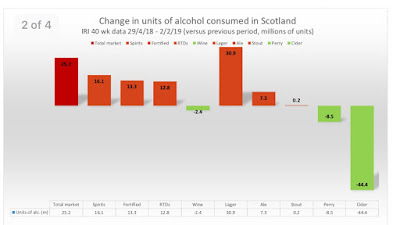The studies might as well have been written before the policy was implemented. Unable to show an actual decline in consumption, the evaluators at Sheffield and Stirling Universities (for it is they) will have to resort to using a back-of-the-envelope counterfactual which will doubtless conclude that consumption is lower than it would have been in the absence of minimum pricing.
This will then be presented to the media as a decline and the policy will be declared as a success, albeit with the caveat that the unit price should be raised to 60p.
Sheffield and Stirling have yet to report back, but today saw the first attempt to rewrite history. Peter Anderson and friends have published a study in the BMJ claiming that alcohol sales fell by 7.6 per cent in the off trade in the first eight months of minimum pricing.
This is a lie, but if you torture the data enough you can make it confess to anything. Instead of looking at the alcohol sales figures in Scotland, they took a sample of 5,000 Scottish households and made numerous adjustments to the figures based on an unspecified counterfactual.
The number of units of alcohol sold in the off trade in the first nine months of minimum pricing actually rose, as the IRI figures below show. We also know that the number of alcohol-related deaths rose in 2018. These are the hard facts and they are in the process of being deleted. As was inevitable, an alternate history is being constructed in which minimum pricing had a dramatic effect on both alcohol sales and alcohol-related deaths. The media fell for it last week, they fell for it today and they will fall for it again in the near future.


No comments:
Post a Comment